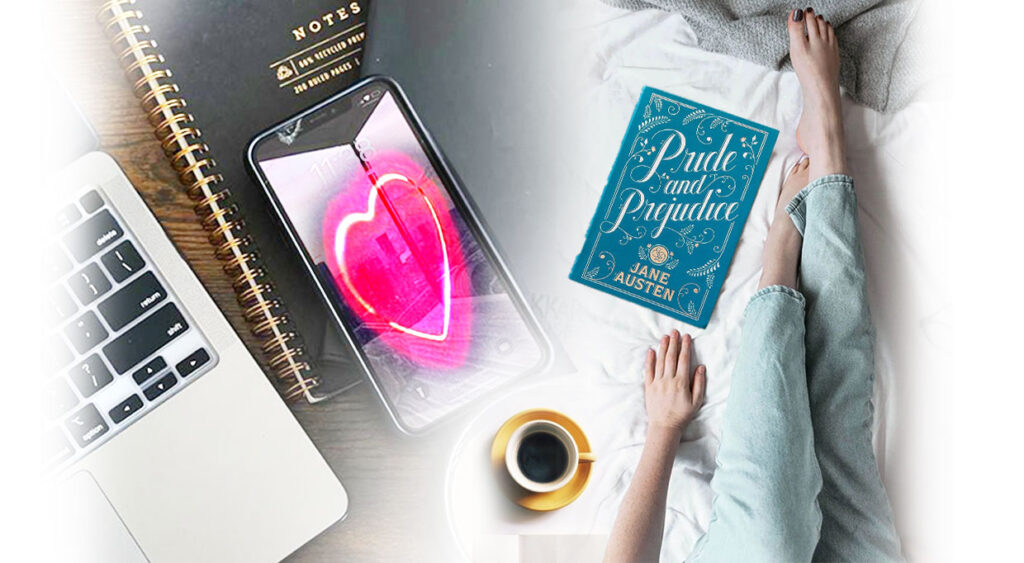It’s a quiet Sunday morning. A cup of coffee steams beside a copy of Pride and Prejudice. As the world rushes outside, a question lingers in the air like the scent of old, damp paper: What would Elizabeth Bennet do today?
Would she swipe left on Mr. Collins? Argue feminism on Twitter? Ghost Darcy after his terrible first impression? Or challenge her way through glass ceilings in boardrooms instead of ballrooms?
Over 200 years have passed since Jane Austen created Elizabeth Bennet and her unforgettable heroines. And yet, their voices – sharp, sarcastic, funny, and observant – still echo in conversations about love, ambition, gender roles, and class. Austen didn’t need grand revolutions; her power lay in subtlety. In wit. In intelligence. In women who knew their worth even when society didn’t.
Austen’s heroines were more than romantic plots. They challenged societal norms and navigated rigid gender roles in a world that offered them limited power. And they settled for nothing but love that is equal and respect that is mutual. Austen’s heroines’ love stories didn’t start with men – they started with self-discovery, with learning to forgive oneself unapologetically.
Elizabeth – arguably Austen’s most famous heroine – is spirited, independent, and unafraid to speak her mind. She values integrity and intellect over wealth or status. What sets her apart is her self-awareness. Elizabeth evolves as the story progresses, recognizes her own prejudices, and learns from them. She challenges the expectations of her time by refusing to marry for convenience, waiting instead for love and respect.
So let’s imagine, just for today, that Lizzy walks among us.
Elizabeth on Career: In a world where ambition is measured by LinkedIn titles and personal branding, Lizzy is a quiet rebel — not chasing corporate accolades for validation, but challenging outdated norms with grace, answering sarcasm with dignity, and meeting taunts with a simple “goodbye.” She would likely choose purpose over prestige. And she would most definitely roll her eyes at hustle culture, which glorifies 70-hour workweeks and burnout.
Dating Apps and Darcy: In a world where the ballroom has turned into Bumble and Tinder, Lizzy would still be picky – not because she thinks she’s better than anyone, but because she knows herself. Her priorities and boundaries are set. And that clarity scares people.
She would swipe left on men who write ‘CEO of my life’ in their bios and those who believe being ‘alpha’ or ‘sigma’ is a personality. Mr Collins would try to pursue her, send awkward voice notes, and over-text. She’d politely mute him.
As for Mr Darcy? She’d block him after his first arrogant message, only to run into him again months later at a mutual friend’s or colleague’s dinner. The spark would still be there. The banter, too. Eyes would meet between sips, and the heart would know. Because chemistry doesn’t care about algorithms.
Still, she wouldn’t fall for Darcy until he listened, until he stopped being proud and started being kind and compassionate. And when she falls, it would be with the same honesty and courage she showed in rejecting society’s expectations.
Gender Roles: Austen’s world was wrapped in silks, subtle gestures, and marriage markets. But beneath the lace were sharp observations about power, independence, and dignity.
Elizabeth, Anne, Elinor, Emma – every one refused to settle. They questioned, resisted, and waited—often without any guarantee of a happy ending. That resistance is what feminism in its truest form (not the distorted version found in social media commentary) looks like even today: the quiet refusal to play a rigged game.
In 2025, Elizabeth wouldn’t necessarily carry a protest sign. But she would definitely raise her voice in boardrooms where women are interrupted and in WhatsApp groups where toxic or sexist jokes fly. She’d call out performative allyship. She’d mentor younger women. She would encourage and uplift others. And she’d value intellect over Instagram filters. Most importantly, she would choose herself—again and again—until someone worthy chooses her, not as an object, but as an equal.
Friendships, Family, and the Feminine Gaze: Austen knew the power of sisterhood long before it became a trending hashtag. In a world obsessed with romance, her books celebrated female friendships, support systems, and resilience. Her modern life would be full of group chats, messy brunches, complicated family dynamics, and quiet nights reading with tea (and more tea!). Not every moment would be life changing – but every moment would be hers.
The Ending She Writes Herself: Elizabeth Bennet today wouldn’t need a Darcy to complete her. But if he grows, if he learns (and unlearns), she might just let him walk beside her. She wouldn’t rush into marriage. She might not marry at all. But she would build a life filled with books, banter, bold choices – and coffee, sometimes. A life on her own terms.
And somewhere in that life, she’d still stop to watch the rain fall on old streets, still find joy in a good conversation, get excited over a simple bowl of dal-chawal, and still believe that the best stories aren’t written in haste. They unfold slowly, bravely, and with meaning.
So this Sunday, ask yourself: What would Elizabeth Bennet do?
She’d raise her chin. Speak her mind. Hold her tribe close to her chest. And never, ever settle (because only mud settles.) And maybe, just maybe, you won’t either.
(The views expressed in this article are those of the author and do not necessarily reflect the views of News Daily 24 or its affiliates)







